Related Research Articles
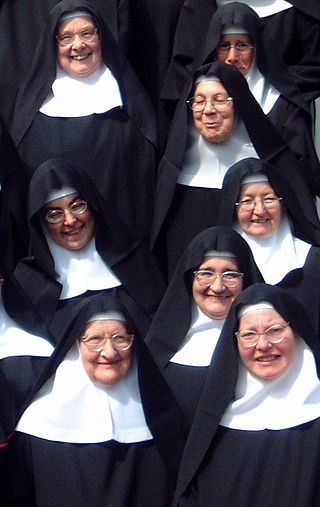
A nun is a woman who vows to dedicate her life to God, typically living under vows of poverty, chastity, and obedience in the enclosure of a monastery or convent. The term is often used interchangeably with religious sisters who do take simple vows but live an active vocation of prayer and charitable work.
A religious order is a lineage of communities and organizations of people who live in some way set apart from society in accordance with their specific religious devotion, usually characterized by the principles of its founder's religious practice. It is usually composed of laypeople and, in some orders, clergy. Such orders exist in many of the world's religions.

The Poor Clares, officially the Order of Saint Clare, originally referred to as the Order of Poor Ladies, and also known as the Clarisses or Clarissines, the Minoresses, the Franciscan Clarist Order, and the Second Order of Saint Francis, are members of a contemplative Order of nuns in the Catholic Church. The Poor Clares were the second Franciscan branch of the order to be established. Founded by Clare of Assisi and Francis of Assisi on Palm Sunday in the year 1212, they were organized after the Order of Friars Minor, and before the Third Order of Saint Francis for the laity. As of 2011, there were over 20,000 Poor Clare nuns in over 75 countries throughout the world. They follow several different observances and are organized into federations.

A monk is a person who practices religious asceticism by living a monastic lifestyle, either alone or with any number of other monks. A monk may be a person who decides to dedicate their life to serving other people and serving God, or to be an ascetic who voluntarily chooses to leave mainstream society and live their life in prayer and contemplation. The concept is ancient and can be seen in many religions and in philosophy.

Christian monasticism is the devotional practice of Christians who live ascetic and typically cloistered lives that are dedicated to Christian worship. It began to develop early in the history of the Christian Church, modeled upon scriptural examples and ideals, including those in the Old Testament, but was not mandated as an institution in the scriptures. It has come to be regulated by religious rules and, in modern times, the Canon law of the respective Christian denominations that have forms of monastic living. Those living the monastic life are known by the generic terms monks (men) and nuns (women). The word monk originated from the Greek μοναχός, itself from μόνος meaning 'alone'.
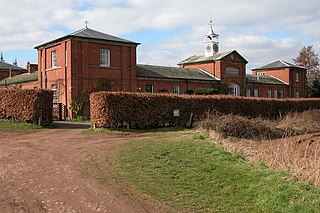
The Society of Saint Francis (SSF) is an international Franciscan religious order within the Anglican Communion. It is the main recognised Anglican Franciscan order, but there are also other Franciscan orders in the Anglican Communion.

Anglican religious orders are communities of men or women in the Anglican Communion who live under a common rule of life. The members of religious orders take vows which often include the traditional monastic vows of poverty, chastity and obedience, or the ancient vow of stability, or sometimes a modern interpretation of some or all of these vows. Members may be laity or clergy, but most commonly include a mixture of both. They lead a common life of work and prayer, sometimes on a single site, sometimes spread over multiple locations. Though many Anglicans are members of religious orders recognized by the Anglican Communion, others may be members of ecumenical Protestant or Old Catholic religious orders while maintaining their Anglican identity and parochial membership in Anglican churches.
The Third Order of Saint Francis is a third order in the Franciscan tradition of Christianity, founded by the medieval Italian Catholic friar Francis of Assisi.
The Community of Christ the King (CCK) was an Anglican religious order of Benedictine nuns near Wangaratta, Victoria, Australia. Founded in 1993, this enclosed and contemplative order was under the jurisdiction of the Anglican Church of Australia. The convent operated guest and retreat facilities and the sisters provided a ministry of spiritual direction.
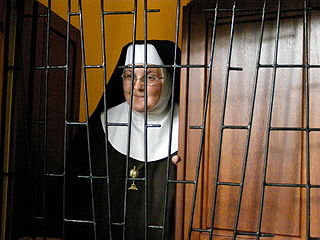
Enclosed religious orders or cloistered clergy are religious orders whose members strictly separate themselves from the affairs of the external world. In the Catholic Church, enclosure is regulated by the code of canon law, either the Latin code or the Oriental code, and also by the constitutions of the specific order. It is practised with a variety of customs according to the nature and charism of the community in question. This separation may involve physical barriers such as walls and grilles, with entry restricted for other people and certain areas exclusively permitted to the members of the convent. Outsiders may only temporarily enter this area under certain conditions. The intended purpose for such enclosure is to prevent distraction from prayer and the religious life and to keep an atmosphere of silence.
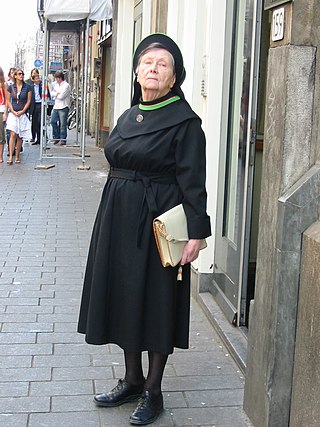
Augustinian nuns are the most ancient and continuous segment of the Roman Catholic Augustinian religious order under the canons of contemporary historical method. The Augustinian nuns, named after Saint Augustine of Hippo, are several Roman Catholic enclosed monastic communities of women living according to a guide to religious life known as the Rule of St. Augustine. Prominent Augustinian nuns include Italian mystic St. Clare of Montefalco and St. Rita of Cascia.
Angelina of Marsciano, T.O.R. was an Italian Religious Sister and foundress, and is a beata of the Roman Catholic Church. She founded a congregation of Religious Sisters of the Franciscan Third Order Regular, known today as the Franciscan Sisters of Blessed Angelina. She is generally credited with the founding of the Third Order Regular for women, as her religious congregation marked the establishment of the first Franciscan community of women living under the Rule of the Third Order Regular authorized by Pope Nicholas V.

Franciscan spirituality in Protestantism refers to spirituality in Protestantism inspired by the Catholic friar Saint Francis of Assisi. Emerging since the 19th century, there are several Protestant adherent and groups, sometimes organised as religious orders, which strive to adhere to the teachings and spiritual disciplines of Saint Francis of Assisi.
The Order of the Annunciation of the Blessed Virgin Mary, also known as Sisters of the Annunciation or Annonciades, is an enclosed religious order of contemplative nuns founded in honor of the Annunciation in 1501 at Bourges by Joan de Valois, also known as Joan of France, daughter of King Louis XI of France, and wife of Louis, the Duke of Orléans, later King Louis XII of France.

Mary Magdalen Bentivoglio was an Italian nun of the Order of St. Clare of the Primitive Observance. She was sent to the United States to found the first monastery of the order in the country and eventually established three monastic communities there before her death. The cause for her possible canonization is now being studied by the Holy See, by which she has been granted the religious title of Servant of God.

The Convent of Poor Clares at Gravelines in the Spanish Netherlands, now northern France, was a community of English nuns of the Order of St. Clare, commonly called "Poor Clares", which was founded in 1607 by Mary Ward. The order of Poor Clares was founded in 1212 by Saint Clare of Assisi as the Second Order of the Franciscan movement. It is an enclosed religious order which follows an austere lifestyle. After the Reformation and its consequence, the Dissolution of the Monasteries between 1536 and 1541 by Henry VIII, the only opportunity for recusant English women to enter religious life was to leave the country and join a community overseas.
Former religious orders in the churches of the Anglican Communion are those communities of monks, nuns, friars, or sisters, having a common life and rule under vows, whose work has ended and whose community has been disbanded. In a very few cases this is due to the termination of the work for which the community was established, but in most cases it is due to amalgamation or the death of the final remaining member of the community.
Mary Ignatius Hayes, O.S.F., also known as Mother Mary Ignatius of Jesus, was an Anglican religious sister who was later received into the Catholic Church and became a Franciscan sister. Her lifetime of religious service, in the course of which she traveled widely, led to the establishment of three separate religious congregations of Franciscan sisters and the establishment of the Poor Clare nuns in the United States.
The Community of the Holy Family (CHF) is an Anglican religious order of nuns, originally founded in the Church of England, but now active in Italy and the United States.
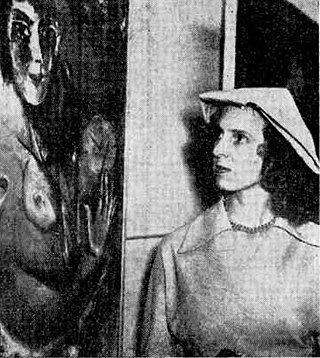
Wendy Hope Solling was an Australian sculptor, Anglican Franciscan nun, and one of the earliest women ordained in the Anglican Church of Australia.
References
The Anglican Religious Communities Yearbook 2004-05. Norwich: Canterbury Press, 2003.
- ↑ The community describes this on this webpage.
- ↑ Sydney Morning Herald, Sept 1989, Good Weekend Magazine, "Nun but the Bold."
